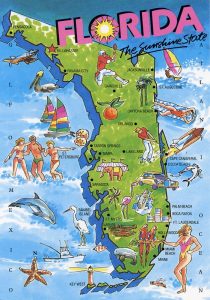Florida policymakers will let voters decide on whether or not the state will broaden its gaming in the near future. State lawmakers could not come to a consensus after several days of debating and failing to find a middle ground.
“There will be no special [session],” Bill Galvano, R-Bradenton, told media via text message after discussions brought zero results. Senate President Joe Negron, R-Stuart, further delved into the proceedings that led to indecision. “Once you’re in session, the governor can expand the call or the House and Senate can expand the call and if there is pressure to do that, that would be challenging,” he said.
The debate over gaming in Florida centers around slot machines and whether parimutuels in eight counties would be allowed to introduce gambling devices in the coming months. There were also discussions about designated player games such as Three-Card, Poker, and Ultimate Texas Hold ’em.
Designated player games, in particular, have found success among gamers in Florida. Melbourne Greyhound Park and Jacksonville Kennel Club have been able to add new employees to their army of workers because of the popularity of their card games. Still, there is concern about the games violating the law as the federal court condemned designated player activities as nothing more than individuals getting involved with banked card gambling.
One saving grace that could have contributed to a better outcome, and possibly policymakers swaying in favor of expanded gaming, is evidence of a reduced gaming footprint. Jose Oliva, R-Miami, proposed a better regulation by requiring owners to obtain gaming licenses. Negron, however, presented the strong claim that those casino owners in rural areas could suffer economic hardship with the mandate of paying for licensing on their shoulders.
Those who opt to follow the new law could be forced to layoff employees. Meanwhile, owners who attempt to keep their businesses afloat sans licensing could eventually suffer the harsh reality of forced closure due to noncompliance with the law. “You would literally have to shut down a business,” Negron revealed. “That is completely antithetical to any pro-business policy.” Ultimates, both Oliva and Negron agreed that there were “too many components to resolve in a short time frame.” Hence, the reason for lawmakers leaving the choice up to voters.
It certainly is not the first time that legislators have tried and failed at expanding gaming on the state level. In fact, the most recent attempt to find common ground is the third in an expansive history of Florida lawmakers disagreeing with one another concerning gambling in the region. Governor Rick Scott commented on the “Voters in Charge” amendment that fuels the current dilemma during a 2015 interview with the Orlando Sentinel.
“We believe that Florida’s constitution gives only voters the power to authorize casino-style gambling in Florida,” he explained. “Murky case law has created the presumption that legislators now have this authority. We hope to argue this point before the Florida Supreme Court in an upcoming case. But in the event of an unfavorable ruling, this amendment would ensure voters maintain the exclusive right to approve or reject casino-style gambling.”
Scott also commented on the notion of outsiders infiltrating the gambling sector in Florida, which is largely influenced by the local Seminole Tribe. “Out-of-state and international gambling conglomerates have long targeted Florida and will continue to do so, whether next year or in the future,” the politician said. “Voters have rejected them time and again because they increase crime, gambling addiction, government corruption and other social ills that taxpayers ultimately pay for. They also would threaten Florida’s multibillion-dollar family-friendly tourism brand that has led our economy forward while gambling-dependent economies continue to lag.”
It certainly seems that Florida legislators are confident in the residents’ ability to discern what is best for the Sunshine State. Will voters rule in favor of expanded gambling this time, though? Outsiders will have to wait to see the outcome of the November elections.







